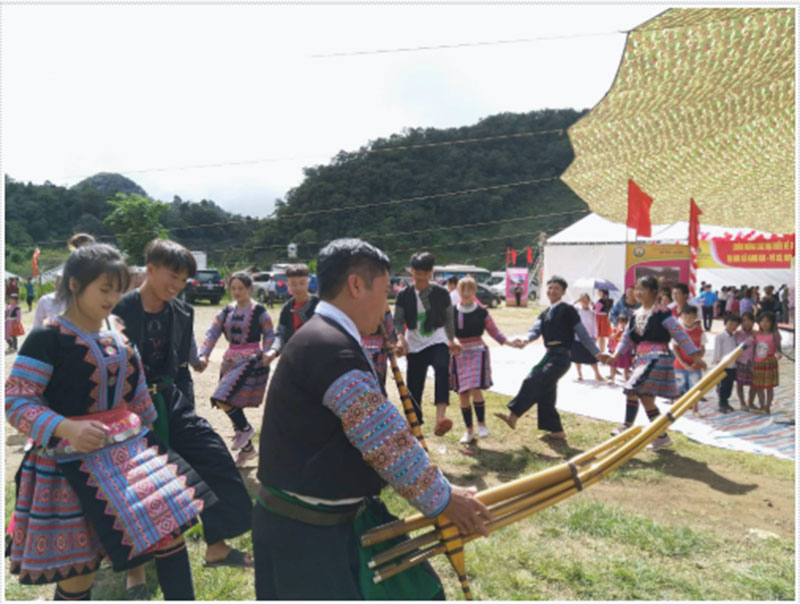
(HBO) - As part of efforts to implement Directive 45-CT/TW issued on September 23, 1994 by the seventh Party Central Committee’s Secretariat on affairs related to the Mong ethnic minority group in Hoa Binh, over the years, the province has mobilised the engagement of the whole political system and applied many measures and solutions to improve the infrastructure system and the living conditions, and preserving the cultural identity of Mong people in Hang Kia and Pa Co communes in Mai Chau district.
 A performance by Mong
artists at the conference to promote tourism and investment in Hang Kia and Pa
Co communes in 2019.
A performance by Mong
artists at the conference to promote tourism and investment in Hang Kia and Pa
Co communes in 2019.
After 25 years of implementing the directive, the living
conditions of Mong people in Hang Kia and Pa Co communes have been improved
obviously. Infrastructure system has been upgraded, while locals have accessed
social security services. The poverty ratio has been reduced through years.
Backward practices have been erased, while the rate of Party
members from the group has increased year by year. Locals have focused on
production and promoting the cultural values of the group.
Along with special policies for ethnic minority groups, the
province has paid much attention in popularising policies and law of the Party
and State among the Mong community.
Therefore, the community got rid of planting opium poppy
trees as well as backward practices, thus preserving and developing their
valuable cultural identity.
The province has trained officials for the Party committee,
and authorities as well as organisations of the two communes. Students from the
group have received support to enter universities and attend training courses.
Therefore, the political system in the communes has become more effective, with
the efficiency of leadership, direction and management activities of the local
government improved.
At the same time, departments, agencies and sectors from the
provincial to district levels have also deployed a number of measures to boost
the production growth of the two communes and care for poor families.
In 2018, the poverty rate in Pa Co dropped to 28.8 percent,
while the rate of households living close to poverty line also fell to 14.34
percent. The figures in Hang Kia were 34.65 percent and 13.68 percent,
respectively.
In order to improve local’s living conditions, the province
has prioritised resources for infrastructure development and applied measures
to strengthen the socio-economic development in the two communes./.
In the spirit of "Party members go first, the people follow”, all households of Party members in the Doan Ket sub-region in Da Bac town, Da Bac district, voluntarily removed gates and fences, and donated land when the road expansion project passed through their properties. Inspired by their example, 68 households in the sub-region quickly followed suit, contributing over 1,400 sq.m of residential and perennial cropland to widen the main road through the residential area. The exemplary role of Party members in Doan Ket stands as a shining example of studying and following President Ho Chi Minh’s thought, morality, and lifestyle.
The Hoa Binh provincial People's Committee held a monthly meeting on May 29 to assess the implementation of socio-economic development tasks in the first six months of 2025, the progress of key projects, and some other important issues.
During his lifetime, President Ho Chi Minh always expressed his deep affection and special concern for children and youth. He once emphasized: "Caring for and educating children well is the responsibility of the entire Party and the entire people”; "First of all, the family (i.e. grandparents, parents, siblings) must do this job well”. "the Party Committees…, the Children’s Committee, the Youth Union, the education sector, and all related organizations must have specific plans to ensure children grow healthier and more progressive”. His teachings has been remaining valuable and serving as the guiding principles in the work of protecting, caring for, and educating children. In line with this ideology, Hoa Binh Province has continuously been prioritizing and investing resources in the well-being of children in recent years.
Mr. Nguyen Phi Long, the alternate Member of the Party Central Committee and Secretary of the Provincial Party Committee chaired the meeting of the Standing Committee of the Provincial Party Committee to provide opinions on several investment projects within the province. There was the attendance of Ms. Bui Thi Minh, the Permanent Deputy Secretary of the Provincial Party Committee and Chairwoman of the Provincial People’s Council; Mr. Bui Đuc Hinh, the Deputy Secretary of the Provincial Party Committee and Chairman of the Provincial People’s Committee and other members of the Standing Committee; the leaders from other departments, agencies, and some localities.
The Standing Board of the Vietnam Fatherland Front (VFF) Committee of Hoa Binh province held a meeting on May 28 to honour outstanding village elders, village heads, and reputable individuals from local ethnic minority and religious communities.
In mid-May, the provincial Museum organised an exhibition named "Duoi la co Dang Cong san Viet Nam quang vinh” (Under the flag of the glorious Communist Party of Vietnam). This meaningful activity took place in the joyful atmosphere to celebrate the country's major holidays and the Party congresses at all levels for the 2025-2030 term, towards the 14th National Party Congress.



 A performance by Mong
artists at the conference to promote tourism and investment in Hang Kia and Pa
Co communes in 2019.
A performance by Mong
artists at the conference to promote tourism and investment in Hang Kia and Pa
Co communes in 2019.